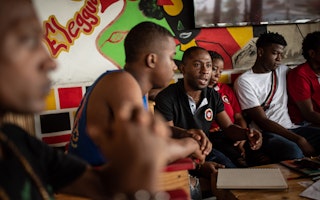Q&A: A Crisis of the Center Right in Latin America

The political landscape in Latin America is undergoing significant shifts, with Gabriel Boric’s recent victory in Chile’s presidential elections and setbacks for Alberto Fernández’s ruling Peronist party in midterm balloting in Argentina. Pedro Abramovay, director of the Latin America Program and regional director for Latin America and the Caribbean at the Open Society Foundations, spoke with Brazilian journalist Afonso Benites about the impact of those elections, Daniel Ortega’s dictatorship in Nicaragua, and Brazilian President Jair Bolsonaro’s waning influence in global debates.
The 2021 elections are beginning to change the political map in Argentina, Honduras, and Chile, while we’re seeing increasing tensions in Nicaragua. How do you assess the outcome of these races?
The contexts are quite different. In Nicaragua, we are seeing a dismantling of democracy. You can’t even call it a democracy anymore. The press is under attack, opponents are being jailed, electoral institutions are being manipulated. What we are seeing in Chile, in Brazil, and will probably see in Colombia’s elections in 2022 is that a country’s position on Nicaragua will become part of the electoral agenda in Latin America. The left needs to take a firmer stance and condemn what is happening there. A democratic left cannot waste time defending dictatorships.
What about Chile and Argentina?
Many of the analyses have only looked at the left in Chile and Argentina—the defeat in the Argentine race and the surprising first-round win in Chile after the Constituent Assembly, with a broad victory for progressive forces. It is common to hear analysts say the left is at a crossroads. But, in essence, the real crisis today is of the center right. It is the center right that is running out of electoral space in Latin America. We have seen the emergence of a far right with such force that it’s shifting the debate, causing the left to rearrange itself.
Is the center right getting weaker and weaker?
The rise of the far right in Latin America has put the center right in check. Even when center-right parties win elections, like in Ecuador, we see radicalization happening. The president declared a state of defense (a lighter form of a state of emergency). It is wrong to say that there’s polarization between the far left and far right. Chile’s is clearly not a radical left, but rather a renewed left. On the right, yes, there is a clear change, with a radicalization process. The calculus of the center right has to be: is our commitment to democracy or to defeating the left?
What does Gabriel Boric’s election as president of Chile represent?
Chile gives us a democratic lesson. It is different from other victories achieved by the left in the early 2000s. Since 2011, there have been movements in Chile that have decided to change society through politics and not anti-politics. It is something similar to what happened during the Cold War, when the left came to power through democratic means—but was later overthrown by a coup.
Boric is a new figure. How much does this weigh on his mandate, which begins without a parliamentary majority?
He is young, but he is not new. He has been in Parliament since 2013. If he had become president back then, it would be different. But he has been in politics for 10 years, since the 2011 movements. Not having a majority in Congress is an opportunity for transformation through dialogue, not force.
What is the impact of regional elections in Brazil?
The ghost of Jair Bolsonaro haunts. Being compared to Bolsonaro is very negative. Bolsonaro can fulfill a role in this debate, as Nicaragua does. The Latin American left can say to voters: “You don’t want your country to become what Brazil has become.”
Bolsonaro often interferes in elections in other countries. How much does this interfere with the government?
Brazil loses a lot. Foreign policy in Brazil is now as ideological as it has ever been. The way Bolsonaro was ill-received in Europe shows that he is seen as something negative. This view that mixes his political ideology with his role as head of state has costs in terms of trade and capacity to influence the global agenda.
Is this one of the reasons why Brazil is no longer considered a major international player?
The role Brazil could play in the world is in the climate debate. That is what it could offer the world, with the Amazon and the capacity it gives it to propose a development model that can generate employment and can end extreme poverty in the region, while leaving the forest standing. We would need to offer credibility in forest preservation. We are very used to looking at credibility only on the financial sphere, but today it goes beyond this. Today, Brazil has no international credibility.
What can be expected from Xiomara Castro’s victory for the presidency of Honduras?
Manuel Zelaya, Xiomara’s husband, suffered a coup [in 2009] when he was the country’s president. He was ousted without due process for presenting an amendment to the Constitution to seek reelection. The mere presentation of this amendment was considered enough for his removal. A new group comes into power, and the first thing they do is approve reelection. What one finds here is the Juan Orlando Hernández administration in a full-on relationship with drug trafficking gangs and the complacency of the Donald Trump administration. This year’s election had everything in place to be stolen, but the difference in votes was so great that there was no way to hide the opposition’s victory. Honduras needs to be closely monitored at all times. It is critical that the entire region and the United States act to protect democracy.


